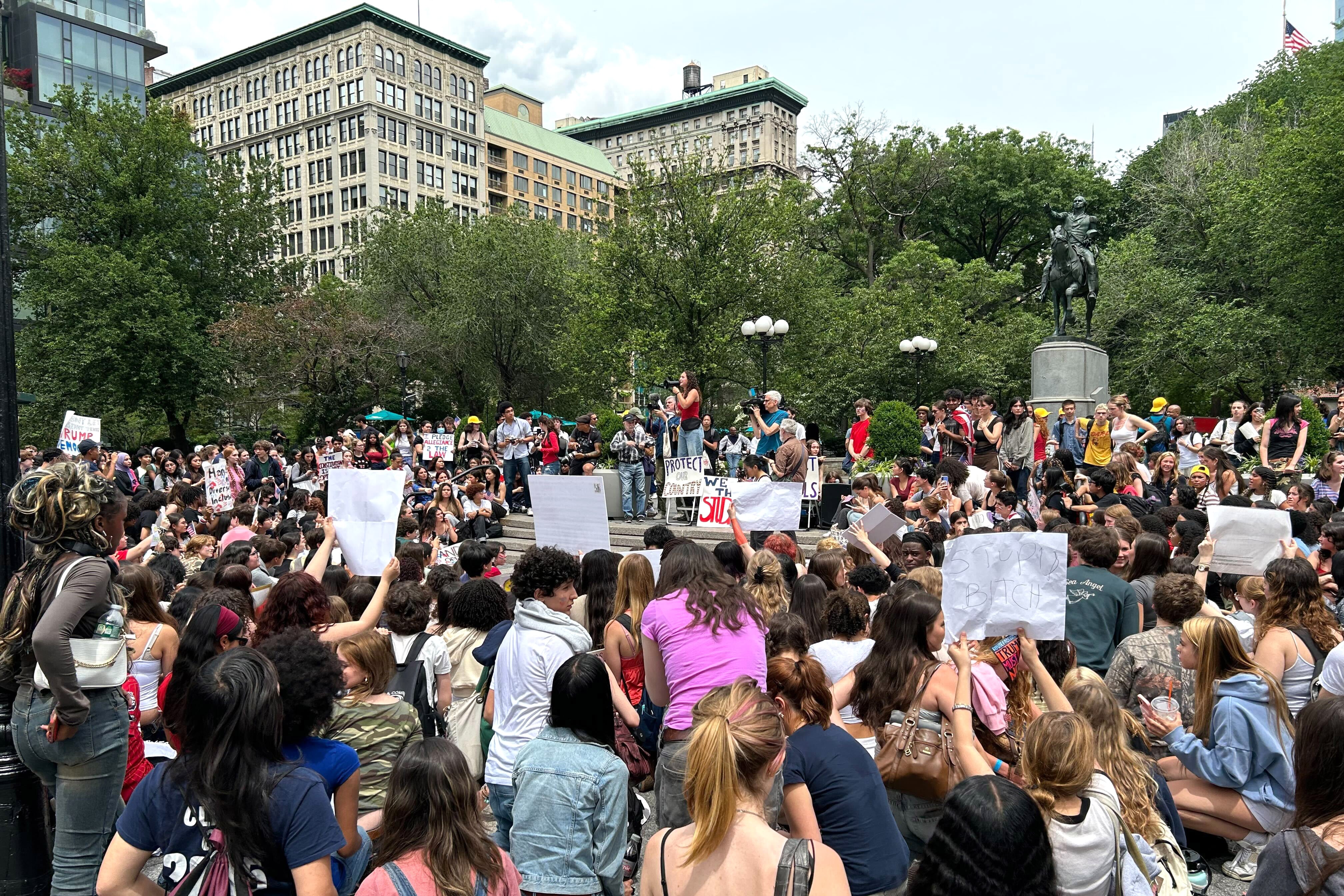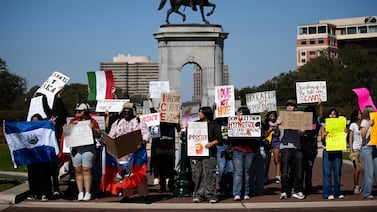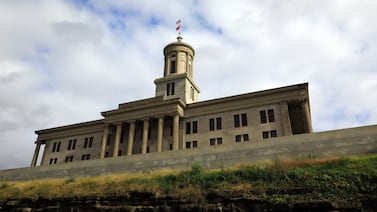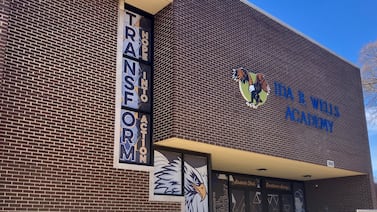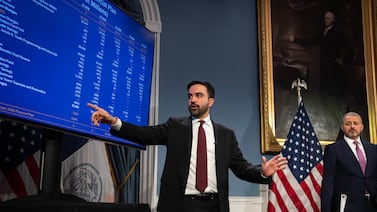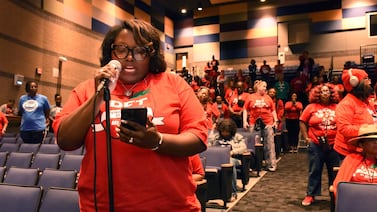Sign up for Chalkbeat New York’s free daily newsletter to get essential news about NYC’s public schools delivered to your inbox.
Hundreds of high school students in New York City walked out of class Tuesday for what organizers called an “anti-Trump, nonpartisan” protest against attacks on democracy under President Donald Trump’s administration.
Teenagers representing dozens of high schools, many sporting red, white, and blue apparel and face paint, met in Union Square. Organizers made the case that pushing back on President Donald Trump’s efforts to crack down on universities and student protesters while ramping up immigration enforcement is a matter of standing up for constitutional rights rather than partisan politics.
“We want to unite kids from all political stances around protecting the constitutional rights that we believe are being threatened right now by the Trump administration,” said Nava Litt, a senior at the Bronx Science of High School who helped organize the protest. She noted that members come from a range of political backgrounds, from “serious pro-Palestinian activists to people who have parents who voted for Trump and have gone to Trump rallies.”
Students touted signs including, “Fascism is bad, actually,” to, “WE’RE NOT RADICAL. WE JUST PAY ATTENTION IN HISTORY CLASS.”
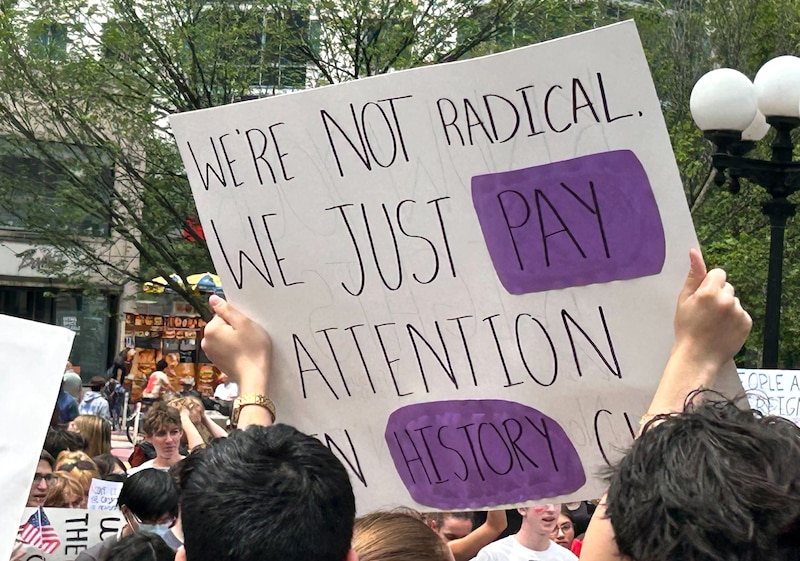
The rally, which follows mass protests in cities across the country in recent months, represents one of the first large-scale mobilizations of New York City K-12 students since Trump took office in January.
One attendee noted that unlike many adult or even college-age protesters, most high school students cannot vote — making it critical for them to raise their voices in other ways.
Litt created a student group called “We the Students” with some of her peers in February as a “nonpartisan, pro-democracy group.” For the walkout, she tapped her social networks, connecting with students from about 20 schools and deputizing “captains” at those campuses to organize their classmates.
Some attendees said they’ve been yearning for a chance to make their voices heard about how the Trump administration’s policies are affecting them and leapt at the chance to protest.
“I lead the political science club at my school, so I’m just kind of constantly looking for stuff like this,” said Madeline LaGreco, a freshman at the Clinton School in Manhattan, who found out about the rally on Instagram, then posted it on her own account to share with friends.
Others had to overcome some hesitation before attending the rally.
“I know a lot of people close to me, a lot of my friends who do go to my school judged me for wanting to go to this,” said Samantha Kim, also a freshman at the Clinton School. “It’s one of those things where they don’t believe in politics. But at this point, it’s not politics, it’s human rights.”
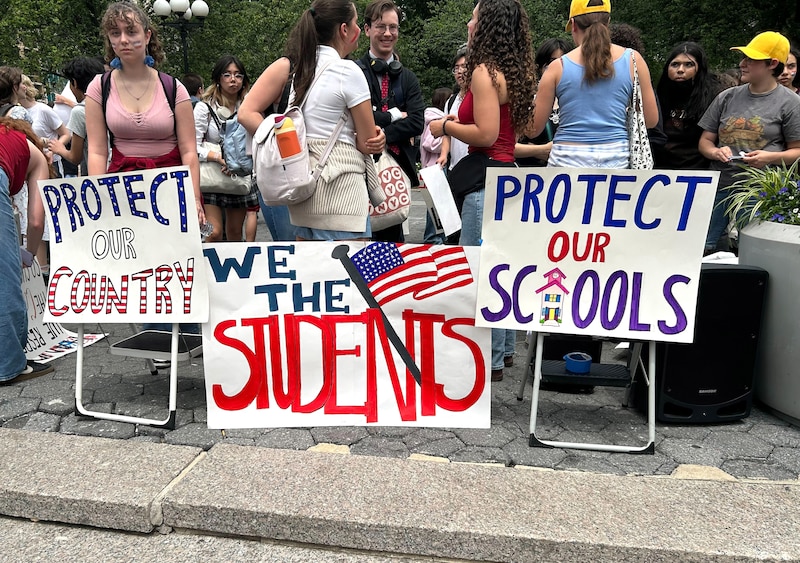
The specific issues that rally attendees and speakers highlighted ran the gamut from the crackdown on academic freedom in higher education, to immigration enforcement, to the targeting of law firms. Several attendees said they were deeply concerned about the effects of threats to pull federal funding from colleges they would be applying to in a matter of years.
Others pointed out that Trump’s efforts to dismantle the federal education department could affect them immediately. Many students raised concerns about the prospect of friends or relatives facing immigration enforcement.
The day before the rally, Chalkbeat reported on a 20-year-old high school student in the Bronx who was detained by Immigration and Customs Enforcement, or ICE, after showing up to a routine court date — the first known case of a current city public school student detained by immigration officials.
“The administration has done so many things, you really can’t even pinpoint one specific thing,” said Abigail, a student at Brooklyn Technical High School who asked to use only her first name. “It calls for just a massive expression of anger directed towards the administration.”
Litt said the idea of walking out of school was rooted in a practical New York City tradition. “Walkouts are something New York City kids do and have done before and understand how they work and understand the tradition of it,” she said. “And there’s a real robust protest culture in New York City high schools, and we want to tap into that energy and tap into that enthusiasm.”
Some students said they were expecting consequences like detention for attending the protest. To minimize academic disruptions, student organizers decided to wait until after AP exams, which took place earlier in May.
City schools Chancellor Melissa Aviles-Ramos said that students who left school before dismissal would be marked absent from any classes they missed.
“We respect the voice of students as they speak out on the difficult issues of our time and advocate for their peers,” she said in a statement. “As we have said repeatedly, our students should remain in school to continue to get the world-class education they deserve.”
Some students said that when they weighed the possible short-term consequences of missing school against the longer-term importance of speaking out, they came down firmly on the side of attending the rally.
“You can be worried about … current repercussions,” said LaGreco, the Clinton School freshman. “But the further this administration does the things that they’ve been doing, the actual repercussions in the real world, not just our school, completely outweigh everything.”
Michael Elsen-Rooney is a reporter for Chalkbeat New York, covering NYC public schools. Contact Michael atmelsen-rooney@chalkbeat.org
Amy Zimmer is the bureau chief for Chalkbeat New York. Contact Amy atazimmer@chalkbeat.org.

